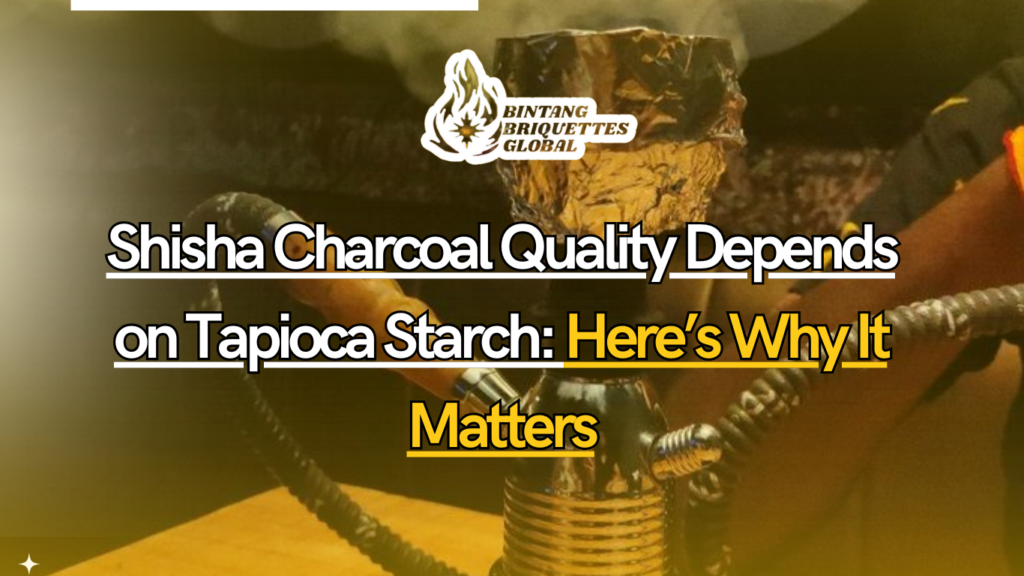1. Introduction
bintangbriquettes.com – Shisha charcoal quality is crucial for delivering a smooth, flavorful, and consistent hookah experience. Among the many ingredients that influence this quality, one stands out for its natural bonding power—tapioca starch. This article explores why tapioca starch is not just a binder, but a performance enhancer in premium coconut charcoal briquettes.
2. Why Shisha Charcoal Quality Matters
Poor-quality charcoal can ruin a shisha session—creating harsh smoke, quick burnout, or even health risks due to chemical additives. The higher the shisha charcoal quality, the cleaner and longer the burn, with minimal ash and no unwanted taste. This is what users expect in lounges or home setups.
3. The Composition of Shisha Charcoal Briquettes
Shisha briquettes are typically made from:
- Coconut shell charcoal powder
- Binders (e.g., tapioca starch)
- Water
Each component plays a role. Tapioca starch is what binds the fine charcoal particles together, enabling clean combustion and structural integrity.
4. The Role of Tapioca Starch in Briquette Production
Tapioca starch binds particles into a solid form without adding toxic chemicals. It:
- Enables uniform compression
- Helps maintain shape and density
- Leaves no residue when burned
Unlike chemical binders, tapioca starch maintains the natural purity that defines high-end shisha charcoal.
5. Tapioca Starch vs. Other Binders
Other binders include corn starch, clay, or chemical adhesives. Tapioca outperforms them due to:
- High bonding strength
- Odorless and tasteless properties
- Complete combustibility
Shisha charcoal quality is enhanced with tapioca because it doesn’t affect the smoke flavor.
6. How Tapioca Starch is Used in Production
During briquette manufacturing:
- Tapioca starch is mixed with charcoal and water
- The blend is pressed under high pressure
- Then dried and cured to form briquettes
The starch activates bonding when heated, forming durable yet natural briquettes that hold together during burning.
7. Impact on Burn Time and Ash Production
Premium shisha charcoal made with tapioca starch shows:
- Longer burn duration (90–120 minutes)
- Lower ash output
- More consistent heat release
Tapioca ensures fewer interruptions, less charcoal rotation, and better session flow.
8. Purity, Safety, and Smoke Flavor
Tapioca starch doesn’t release toxins when burned. It ensures:
- No bitter or chemical flavors
- Cleaner smoke
- Safer for health-conscious users
This contributes heavily to consumer trust in premium brands.
9. Quality Control and Testing
Reputable manufacturers test:
- Binding consistency
- Combustion cleanliness
- Structural stability of briquettes
Products that use food-grade tapioca starch often meet higher export standards for Europe and the Middle East—where shisha charcoal quality is strictly regulated.
10. Market Preference for Premium Binders
Distributors and lounges prefer charcoal with:
- Uniform size and burn behavior
- No chemical odor
- Eco-friendly formulation
This demand places tapioca starch-based briquettes at a competitive advantage in global markets.
11. Sustainability of Tapioca as a Natural Binder
Tapioca (from cassava root) is:
- Renewable and biodegradable
- Easily sourced in tropical regions like Indonesia
- An environmentally friendly alternative to synthetic additives
Using tapioca aligns with the growing demand for sustainable hookah products.
12. Case Studies and Real-World Applications
Case Study: Bintang Briquettes uses tapioca starch to meet German and Middle Eastern quality standards.
- Lounge Feedback: “No chemical smell and long-burning quality.” — Berlin Lounge Owner
- Consumer Review: “Even burn and easy heat management.” — UAE Shisha Enthusiast
13. How to Choose High-Quality Charcoal with Tapioca Starch
When selecting charcoal:
- Look for ingredient transparency
- Confirm tapioca starch usage
- Verify ash percentage and burn time on packaging
Shisha charcoal quality starts with informed choices.
14. Tips for Consumers and Lounge Owners
- Store charcoal in dry areas to protect starch bonds
- Avoid using damp briquettes—they burn unevenly
- Choose cube or hexagonal shapes for even heat distribution
15. The Future of Shisha Charcoal Quality
Innovation in binder technology continues, but tapioca starch remains unmatched for natural purity and performance. As regulations tighten and consumers become more selective, the industry leans more on organic, clean-burning binders.
16. Conclusion
Shisha charcoal quality depends heavily on the binder used. Tapioca starch, a natural, eco-friendly, and high-performing option, has proven itself to be essential in producing reliable, premium-grade coconut briquettes. As awareness grows, tapioca will remain a key player in shaping the future of clean, safe, and enjoyable shisha smoking sessions.

